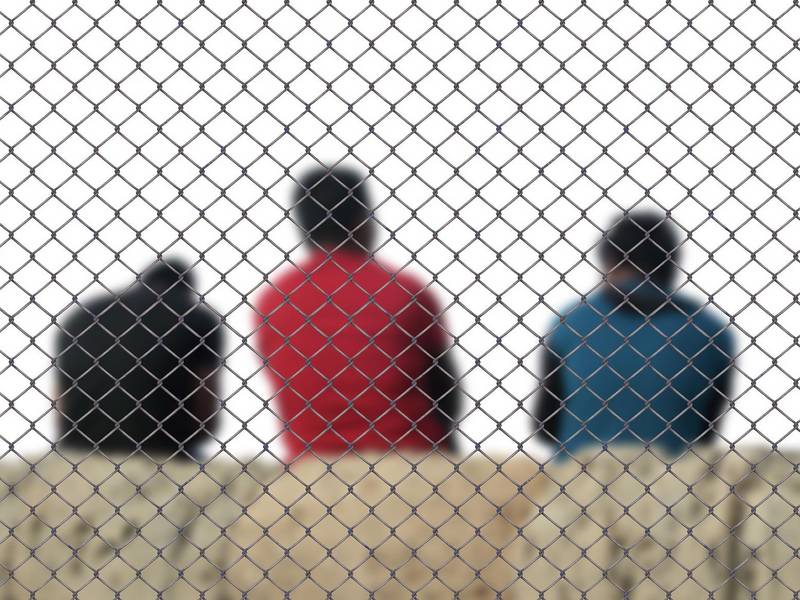As the National Human Rights Institution in Slovenia (NHRI), which, among other things, carries out supervisory tasks, the Ombudsman produced a report on the human rights situation of migrants at the borders. The report was drawn up in the framework of the European Network of National Human Rights Institutions (ENNHRI) project, which aims to improve the promotion and protection of the human rights of migrants at the borders through various activities of European NHRIs, such as capacity building, advocacy, communication and reporting.
The report covers the Ombudsman's work in the field of migration over the last three years. It presents findings and recommendations addressed to the Ministry of the Interior on the basis of investigations into police procedures conducted in relation to migrants at different locations. The report includes the findings of the Ombudsman's visits to the two border police stations of Črnomelj and Metlika (June 2018), the findings of an investigation concerning a border incident that included a visit to the border police station of Ilirska Bistrica (October 2019), the findings of the investigation conducted at the Centre for Foreigners in Postojna (31 July and 3 September 2020) and the NPM's visit to the Asylum Centre in Ljubljana (2018), where the Ombudsman documented the living conditions of migrants.
The report also contains information on the Ombudsman's written submissions made to the national courts in cases concerning migrants, including the constitutional complaint he initiated in the case of a migrant returned to the Croatian authorities at the border crossing point on the basis of the bilateral agreement between Croatia and Slovenia, and the amicus curiae opinion that he delivered to the Administrative Court of the Republic of Slovenia regarding a case of chain returns from Slovenia through Croatia to Bosnia and Herzegovina. The report also highlights recent changes to Slovenian legislation on migration and asylum, which may affect the rights of migrants and asylum seekers in the country.
National reports were also prepared by the NHRIs from Croatia, France, Greece and Serbia. All are available on the ENNHRI website, and a summary report will be published shortly.
A few highlights are presented below.
In June 2018, the Ombudsman started to pay unannounced visits to police stations in order to check the procedures involving migrants due to an increasing number of allegations of their illegal return to Croatia. The Ombudsman’s inquiries revealed a number of irregularities, including a lack of individual case examination and inadequate documentation of procedures. The Ombudsman also took note of internal guidelines, which included instructions to hand over to the Croatian authorities any individual whose procedure was conducted by a joint Slovenian-Croatian police patrol, even though he or she expressed his or her intention to apply for asylum while in Slovenia.
The Ombudsman’s report also notes that the majority of migrants are returned to Croatia and to other neighbouring countries by the Slovenian authorities without issuing a written decision, so they do not have access to a legal remedy to challenge their return or surrender. The legality of the return of foreigners without a return decision is currently challenged before the Constitutional Court of the Republic of Slovenia by a constitutional complaint lodged by the Ombudsman with the consent of a Moroccan citizen who was returned in such a manner.
Moreover, the Ombudsman, in the case of a Cameroon citizen who had suffered a chain return from Slovenia via Croatia to Bosnia and Herzegovina, intervened with an amicus curiae opinion before the Administrative Court of the Republic of Slovenia. Based on the completed procedure, the Slovenian authorities have been ordered by a final judgment to allow the plaintiff to enter Slovenia and also allow him to apply for international protection.
Some of the shortcomings that negatively affect border procedures in Slovenia were already known to the Ombudsman prior to 2018, in particular the inconsistent quality (and sometimes absence) of language interpretation, the lack of access to legal assistance, the inconsistent application of the protocol to unaccompanied minors and cases of the return of unaccompanied minors without issuing a return decision.
Persons wishing to apply for international protection are detained in the pre-admission facilities of the Asylum Home, in crowded conditions without free access to its other parts, and without the issuance of a decision on detention and consequently the possibility of lodging a legal remedy. In 2018, the Ombudsman, after a visit to the Asylum Home in the capacity of the NPM, found that such treatment indicates the de facto deprivation of freedom of movement.
In the middle of 2020, migrants in the Centre for Foreigners in Postojna were detained in containers with little daylight and no possibility of daily exits and outdoor exercise. Container accommodation was supposed to be a temporary measure aimed at preventing the spread of COVID-19 and was to last between 10 and 14 days. However, the Ombudsman’s staff found that detention in containers could last for more than a month, that the duration of such accommodation was not recorded, and that no other verification of how long individuals had lived in containers was carried out. The Ombudsman also noted the excessive use of police dogs and suggested that the competent authorities refrain from this practice. During the visits, the Ombudsman further noted that the deadline of six working days for the registration of asylum applications was often not observed; therefore, he suggested to the Ministry of the Interior that appropriate staffing, organisational and other necessary measures should be taken to ensure timely processing.
The Ombudsman also advocates a change in the long-standing practice of placing children involved in return procedures, including unaccompanied children, in the Postojna Centre for Foreigners instead of in appropriate institutions, as prescribed by law.
* * *
The European Network of National Human Rights Institutions (ENNHRI) brings together more than 40 National Human Rights Institutions (NHRIs) across Europe. One of the priority areas of ENNHRI’s work is the "Asylum and Migration" area, in which the Working Group on Asylum and Migration, with the participation of more than 30 European NHRIs, plays an important role.
National Report on the situation of human rights of migrants at the borders
National Report on the situation of human rights of migrants at the borders - Executive Summary
National Report on the situation of human rights of migrants at the borders - Fact Sheet

![[Translate to English:] Raztrgana ograja - beg v svobodo](/fileadmin/_processed_/d/9/csm_OMEJITEV_SVOBODE_-_IZHOD_-_SVOBODA_-_background-3332559_1920_c620567335.jpg)
